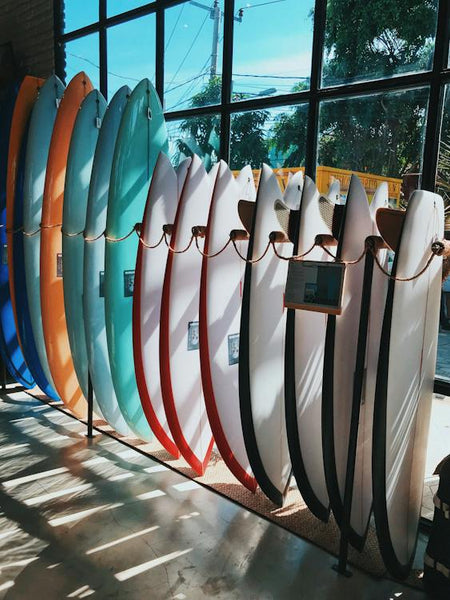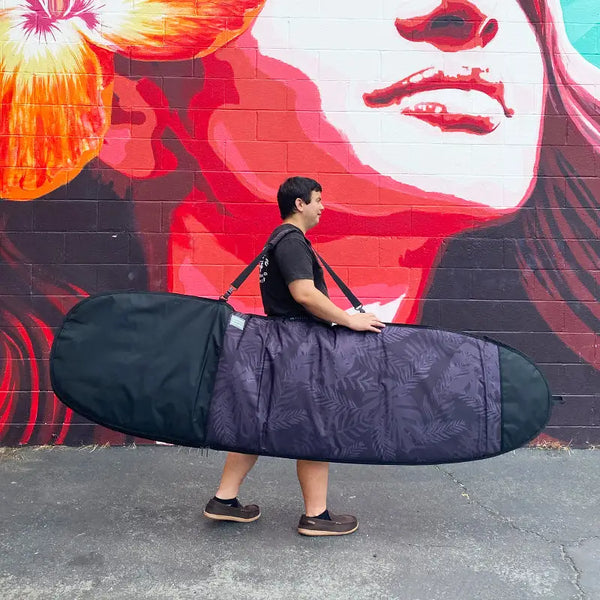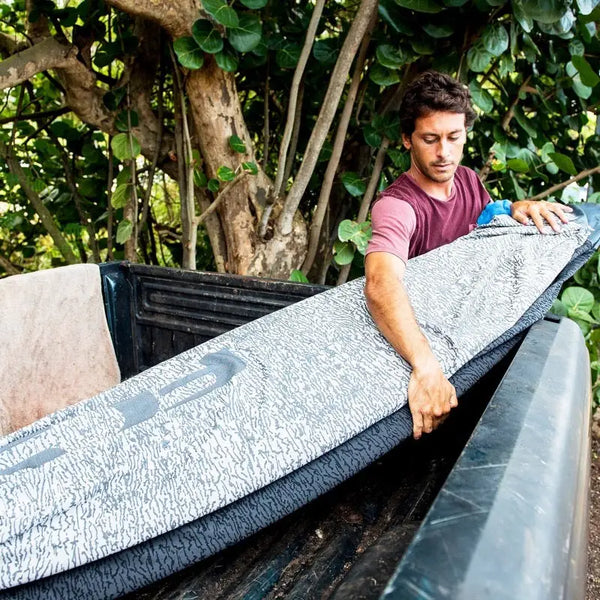Protect Your Surfboard: The Ultimate Guide to Proper Storage
Share
Surfboards can be a big investment, with high-performance boards easily costing $900 or more.
Like any investment, you'll want to protect the value of your surfboard by properly caring for it. One of the most important things you can do is store your surfboard correctly when you're not using it.

Proper storage will protect your board from damage and maximize its lifespan. In this ultimate guide, we'll go over everything you need to know about storing your surfboard to maintain its performance and value.
Reduce Sun Exposure
One of the biggest threats to the lifespan of your surfboard is excessive sun exposure. The sun's UV rays can cause the resin and fiberglass of your board to break down over time, compromising its structural integrity.

When possible, store your board out of direct sunlight when not in use. If you store it outside, keep it in a shaded area or cover it with a thick towel or board bag. Even when in use, try to limit direct sun exposure by using a board sock or keeping it deck-side down when not riding waves. The less sun your surfboard gets, the longer the fiberglass will last.

SHOP NOW
Proper Racking
Many surfers store their boards by resting them against a wall. However, this can put pressure on the rails and fins, resulting in dings and broken fins over time. It's better to store your board in a rack designed for surfboard storage. Hang racks lift the board off the ground and cradle it to prevent pressure points. Vertical racks also work well. You can DIY a surfboard rack cheaply and easily too. Just make sure the board is fully supported along its length. Racks prevent the board from falling over and hitting the ground or other objects that could damage it.

Control Temperature and Humidity
Heat, cold, and moisture can also damage your surfboard over time. Avoid storing boards in areas with extreme temperature fluctuations or high humidity. The resin can become brittle and crack if exposed to very low temperatures. High heat can cause air pockets or delamination. Moisture from high humidity can waterlog the foam core. Ideal conditions are room temperature around 70F and moderate humidity around 50%. If you live in an area with seasonal weather extremes, consider storing your board indoors when not using it for extended periods. Laying it flat on a rack instead of standing it up also reduces moisture exposure.
Keep Away from Harmful Materials
Your storage space should be clean and free of chemicals, solvents, or corrosive materials. Residue from cleaners, car care products, paint supplies, etc. can eat away at the fiberglass and foam. Avoid storing your board in the garage if that's where you keep chemicals. Oils and grease can also penetrate the fiberglass and be difficult to remove. Make sure your storage space is a clean, dry place away from anything that could potentially damage your board.
Use Board Bags and Sock Covers
Using a board bag or board sock is an easy way to add an extra layer of protection, especially when traveling. The soft cushioning prevents dings and abrasions if you have to check your board with an airline. Leave the sock on when storing your board as well.

Using a board travel bag or board sock is an easy way to add an extra layer of protection, especially when traveling.

Inspect Periodically
Make it a habit to inspect your surfboard every month or so when it's in storage. Look for any cracks in the fiberglass or soft spots in the foam. Identify potential problems early so they can be repaired before worsening. Checking for things like leaky fins and waterlogging can help prevent bigger issues down the road. Doing inspections when you first put your board into storage for the season is important as well.
Maximize Lifespan with Proper Storage
Storing your surfboard correctly is just as important as choosing the right board and maintaining it. Following these storage best practices will help protect your investment so you can enjoy high performance and top value for many seasons. Keeping your board out of the sun, properly racked, in ideal conditions, and well protected pays off with a longer lifespan. Show your board some love between sessions by making sure storage doesn't jeopardize performance or damage its structure. Your board will thank you for it every time you paddle out!

CHECK OUT SURFBOARD BAGS!
Read More 🔎
THE BEST SURFBOARD SOCK FOR ULTIMATE PROTECTION
SURF ETIQUETTE A TALK STORY BY ZANDER MORTON
